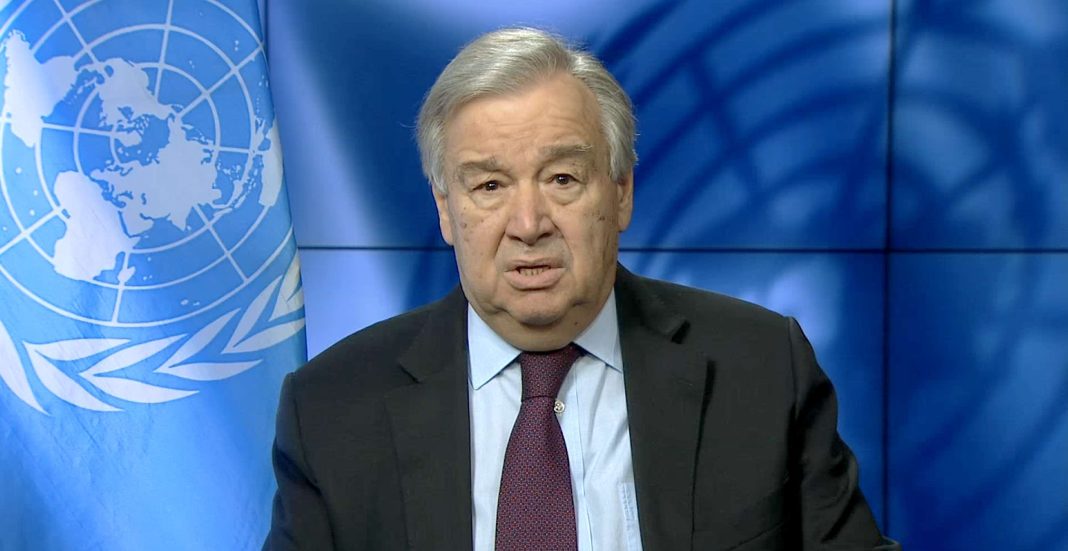By Janet Ekstract
NEW YORK- In his year-end address toward the end of December, UN Secretary-General Antonio Guterres warned of “hard times ahead” if the climate crisis is not faced head on. Guterres commented: “To add fuel to the fire, we are still off-track in addressing the climate crisis – another amplifier of global injustice and inequality.” The secretary-general pointed out that COVID-19 is very much a huge threat and that inequities in society continue to increase. He highlighted that there continue to be “diminishing resources for recovery, rising inflation and mounting debt” that remain huge burdens for many countries. Guterres also highlighted growing inequality on a global scale that shows no signs of abating.
On December 16, Guterres said the UN released a report that shows in great detail the efforts of the United Nations over the past year in all areas “from health to humanitarian to socio-economic action.” He added that the UN has “fully mobilized” for the COVID-19 response and recovery. Guterres emphasized that two months ago, the World Health Organization (WHO) revealed a strategy to get 40 percent of people in all nations, vaccinated by the end of the year and 70 percent by the middle of next year. Guterres said: “That strategy requires the total commitment of Member States – especially those with vaccine production capabilities or large supplies.”
The secretary-general lamented that days before the deadline, 98 countries weren’t able to meet that end-of-year target. He added that “40 of them have not yet even been able to vaccinate 10% of their population.” Guterres commented that in lower-income countries, less than four percent of the population are fully vaccinated while the vaccination rates in high-income countries are eight times higher than in African nations. He pointed out: “We cannot defeat the pandemic in an uncoordinated way” and said that Africa won’t even meet a 70 percent threshold of vaccinated population until August 2024. Guterres stressed that it is “vaccine inequity” that is adding to the proliferation of diverse variants that is wreaking havoc “in every corner of the globe.”Guterres reiterated that “all countries” – specifically those with more responsibilities need to “take concrete action in the coming days to make greater progress to achieve WHO’S global 40 percent target and be far more ambitious in their efforts to reach 70 percent of people in all countries by the middle of 2022.” He reemphasized that the developing world is always the first one to be hard hit and especially so during the COVID-19 pandemic. Guterres remarked that: “Lopsided COVID-19 recovery efforts are accelerating inequalities and increasing stresses on economies and people.” He added: “Today’s global financial system is supercharging inequalities and instability,” further commenting that: “In Sub-Saharan Africa, the International Monetary Fund projects that cumulative economic growth per capita over the next five years will be 75 percent less than the rest of the world. This is unacceptable.”
He drew attention to the fact that inflation is widespread in many nations including the U.S. and has risen to a “40-year high and we see it growing elsewhere.” Guterres highlighted that this situation will put even greater financial strain on countries that need the most help. He warned: “International financial institutions alone do not have sufficient capacities to compensate.” Guterres cautioned that “credit rating agencies undermine the credibility of developing countries with good growth prospects and vital development needs, and this obviously makes private finance become more risk averse.”
A final warning from the secretary-general is that “social upheaval and polarization” will be the results of rising inequality worldwide. He warned: “This is a powder keg for social unrest and instability” which Guterres said “poses a clear and present danger to democratic institutions.” His cautionary note: “It is time to clearly assume the need for reform of the international financial system.” The secretary-general said there is not only a “serious governance problem” regarding prevention, detection and response to pandemics,” it is also with regard to the international finance system. Guterres said that he is “determined that 2022 must be the year in which we finally address the deficits in both governance systems.”




